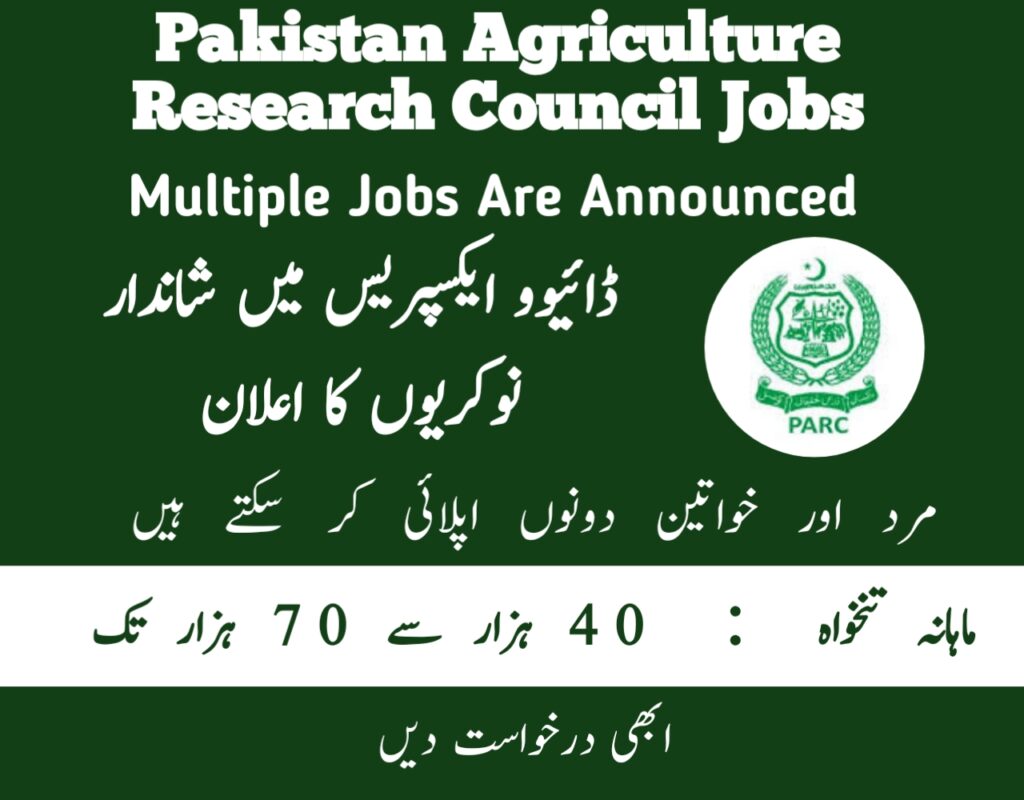Introduction:
In Pakistan, agriculture serves as the backbone of the economy, employing a significant portion of the workforce and contributing substantially to the GDP. However, the sector faces numerous challenges ranging from climate change to outdated farming practices. To address these challenges and foster agricultural innovation, the Pakistan Agriculture Research Council (PARC) plays a pivotal role. This article delves into the various job opportunities offered by PARC and its significance in advancing agricultural research and development in Pakistan.
Overview of Pakistan Agriculture Research Council (PARC):
Established in 1981, PARC is a premier research institution mandated to conduct scientific research, improve agricultural productivity, and enhance the livelihoods of farmers across Pakistan. It operates under the Ministry of National Food Security and Research, striving to bridge the gap between research outcomes and practical application in the agricultural sector.
Importance of Agricultural Research:
Agricultural research is crucial for addressing the multifaceted challenges faced by the sector. From developing resilient crop varieties to implementing sustainable farming techniques, research forms the cornerstone of agricultural development. PARC serves as a hub for such research endeavors, collaborating with national and international partners to innovate and disseminate knowledge.
Job Opportunities at PARC:
Research Scientist:
Research scientists at PARC are tasked with conducting cutting-edge research in various fields of agriculture. They design experiments, analyze data, and publish findings in scientific journals. Research scientists play a pivotal role in developing new crop varieties, optimizing agricultural practices, and mitigating pest and disease outbreaks.
Agricultural Engineer:
Agricultural engineers at PARC focus on designing and implementing technologies to enhance farm efficiency and productivity. They develop irrigation systems, mechanized farming equipment, and post-harvest processing facilities. Agricultural engineers play a vital role in modernizing the agricultural sector and improving resource utilization.
Plant Breeder:
Plant breeders are responsible for developing improved crop varieties with desirable traits such as high yield, disease resistance, and tolerance to environmental stress. They utilize advanced breeding techniques, including molecular genetics and genomics, to accelerate the breeding process. Plant breeders contribute significantly to food security and sustainable agriculture.
Soil Scientist:
Soil scientists study the physical, chemical, and biological properties of soil to optimize fertility and productivity. They conduct soil surveys, analyze nutrient levels, and recommend soil management practices. Soil scientists play a critical role in promoting soil conservation and mitigating land degradation.
Agronomist:
Agronomists at PARC focus on optimizing crop production systems to maximize yield and minimize environmental impact. They advise farmers on crop selection, planting techniques, and nutrient management practices. Agronomists conduct field trials and demonstrations to validate research findings and disseminate best practices.
Entomologist:
Entomologists study insects and their interactions with crops to develop integrated pest management strategies. They identify pest species, monitor population dynamics, and recommend control measures. Entomologists play a crucial role in minimizing crop losses due to insect pests while reducing reliance on chemical pesticides.
Extension Officer:
Extension officers bridge the gap between research institutions and farmers by disseminating scientific knowledge and technologies. They organize training workshops, field days, and farmer field schools to promote best agricultural practices. Extension officers play a vital role in technology transfer and capacity building at the grassroots level.
Economist:
Economists at PARC analyze the economic viability of agricultural interventions and policies. They conduct cost-benefit analyses, assess market trends, and evaluate the impact of government programs. Economists provide valuable insights for decision-making and resource allocation in the agricultural sector.
Significance of PARC Jobs for Agricultural Development:
The job opportunities offered by PARC are instrumental in driving agricultural innovation and fostering sustainable development. By attracting talented professionals and researchers, PARC strengthens the research ecosystem and accelerates technology adoption in the agricultural sector. Moreover, PARC jobs contribute to capacity building, knowledge dissemination, and policy advocacy, ultimately improving the livelihoods of farmers and ensuring food security for the nation.
Conclusion:
In conclusion, the Pakistan Agriculture Research Council (PARC) plays a vital role in advancing agricultural research and development in Pakistan. Through a diverse range of job opportunities, PARC attracts skilled professionals and researchers who contribute to innovation, technology adoption, and policy advocacy in the agricultural sector. By prioritizing agricultural research and investing in human capital, PARC aims to address the challenges faced by the sector and pave the way for a sustainable and prosperous agricultural future in Pakistan.
